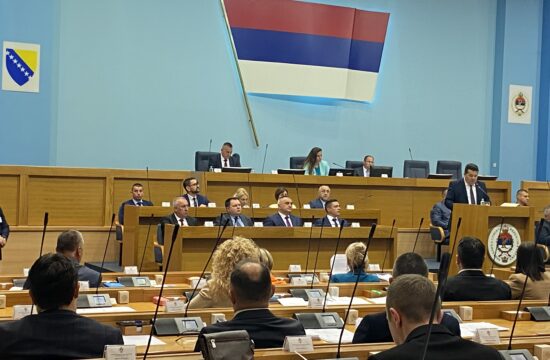Bosnia's Constitution says state level institutions are the sole decision makers when it comes to issues regarding migration, visas and asylum, the Chairman of Bosnia's Council of Ministers, Denis Zvizdic, said in a press release on Tuesday, referring to the recent stopping of a migrant convoy by local police in one of the country's cantons.
Zvizdic released the press statement in reaction to statements made by “certain officials” in regard to the migrant issue, he wrote.
State institutions had last week organized the transport of some 270 migrants, who had arrived in Sarajevo after crossing the border into Bosnia on their route towards Western Europe, towards an asylum centre in Salakovac, near the southern city of Mostar which lies in the Herzegovina-Neretva canton (HNK).
But HNK police stopped the buses as they approached their area of responsibility, insisting they return to Sarajevo.
After a substantial quarrel between the local and the state authorities, the buses proceeded towards the centre but the developments had angered officials in Sarajevo who said that the HNK Interior Ministry had defied government-level institutions and therefore had committed a grave crime.
The police commissioner who gave the order to stop the buses was subsequently questioned by state police.
According to the Croatian Democratic Union (HDZ), which is in power in HNK, the migrant convoy was illegal.
“We consider such an act illegal and one-sided, regardless of who discussed it and how, up until the point when the only competent state governmental body, the Council of Ministers, in agreement with Cantonal and city authorities makes such a decision,” the party said in a statement following the developments on Friday.
In his Tuesday statement, Zvizdic said that “the Constitution of Bosnia and Herzegovina unequivocally states the institutions of Bosnia and Herzegovina are solely responsible for issues regarding migration, visas and asylum,” and that the country is, according to its Constitution, obligated to “respect international conventions and standards which regulate basic human rights.”
Statements implying that the lower government level, “in this case, the Ministry of Interior of the Herzegovina-Neretva Canton”, can make decisions on the accommodation of migrants are “contrary to the laws in place and can be interpreted as a completely unconstitutional ban on the freedom of movement,” Zvizdic's statement said.




